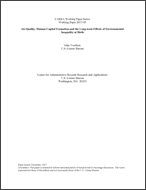
An official website of the United States government
Here’s how you know
Official websites use .gov
A .gov website belongs to an official government organization in the United States.
Secure .gov websites use HTTPS
A lock (
) or https:// means you’ve safely connected to the .gov website. Share sensitive information only on official, secure websites.
-
//
- Census.gov /
- Library /
- Census Working Papers /
- The Long-term Effects of Environmental Inequality At Birth
Air Quality, Human Capital Formation and the Long-term Effects of Environmental Inequality at Birth
Air Quality, Human Capital Formation and the Long-term Effects of Environmental Inequality at Birth
Abstract
A growing body of literature suggests that pollution exposure early in life can have substantial long term effects on an individual’s economic well-being as an adult, however the mechanisms for these effects remain unclear. I contribute to this literature by examining the effect of pollution exposure on several intermediate determinants of adult wages using a unique linked dataset for a large sample of individuals from two cohorts: an older cohort born around the 1970, and a younger cohort born around 1990. This dataset links responses to the American Community Survey to SSA administrative data, the universe of IRS Form 1040 tax returns, pollution concentration data from EPA air quality monitors and satellite remote sensing observations. In both OLS and IV specifications, I find that pollution exposure at birth has a large and economically significant effect on college attendance among 19-22 year olds. Using conventional estimates of the college wage premium, these effects imply that a 10 μg/m3 decrease in particulate matter exposure at birth is associated with a $190 per year increase in annual wages. This effect is smaller than the wage effects in the previous literature, which suggests that human capital acquisition associated with cognitive skills cannot fully explain the long term wage effects of pollution exposure. Indeed, I find evidence for an additional channel working through non-cognitive skill—pollution exposure at birth increases high school non-completion and incarceration among 16–24 year olds, and that these effects are concentrated within disadvantaged communities, with larger effects for non-whites and children of poor parents. I also find that pollution exposure during adolescence has statistically significant effects on high school non-completion and incarceration, but no effect on college attendance. These results suggest that the long term effects of pollution exposure on economic well-being may run through multiple channels, of which both non-cognitive skills and cognitive skills may play a role.
Others in Series
Working Paper
Working Paper
Working Paper
Share
Related Information
Some content on this site is available in several different electronic formats. Some of the files may require a plug-in or additional software to view.
 Yes
Yes
 No
NoComments or suggestions?


Top

